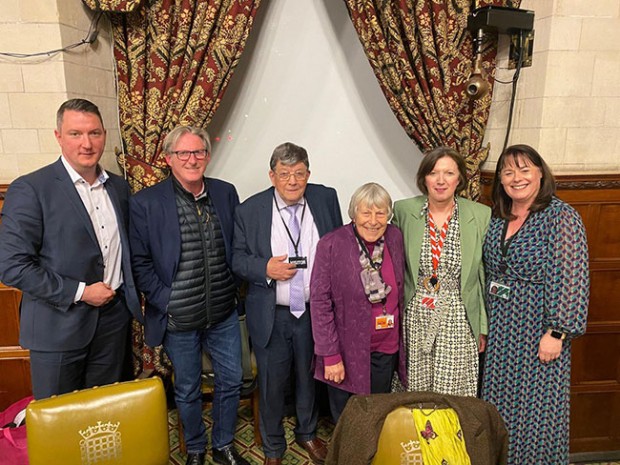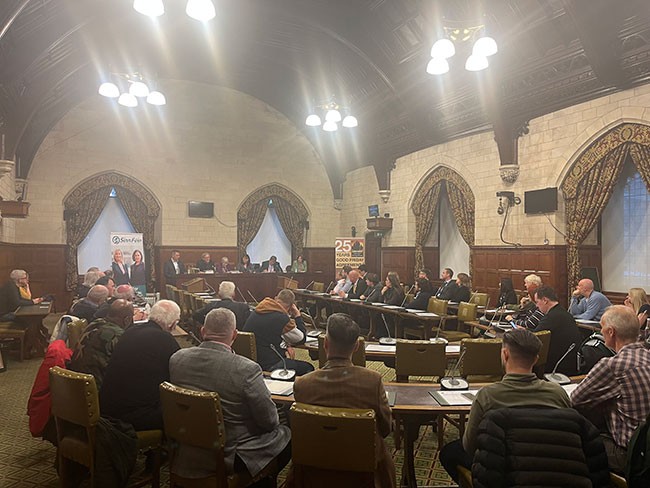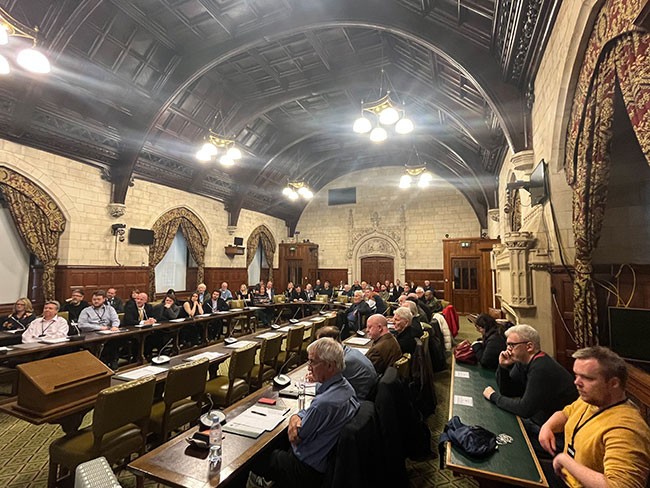10 May 2023
Defending the Good Friday Agreement

• John Finucane, Adrian Dunbar, Pat Doherty, Helen Jackson, Frances O’Grady and Michelle Gildernew at the Sinn Féin London meeting marking 25 years of the Good Friday Agreement
On 25 April, a public meeting was held in Westminster, sponsored by Chris Hazzard MP, to reflect on the 25 years since the Good Friday Agreement. The meeting was attended by British parliamentarians, members of the legal profession, trade unionists, political activists, and members of the Irish community in Britain.
Michelle Gildernew, MP for Fermanagh and South Tyrone, chaired the evening’s discussion and began by reflecting on her own memories of the conclusion of the all-party talks in 1998. At that time, she was head of Sinn Féin’s London Office and was watching events unfold on a television set in a London flat. She said it felt appropriate to be back in London, 25 years on, to reflect on what was secured that momentous day.
The first speaker was Pat Doherty, former Sinn Féin Vice President and MP for West Tyrone from 2001 till 2017. Pat charted the conversations and debates that took place amongst the leadership of the republican movement in the pursuit of a peaceful way forward. He noted the initial, secretive, talks with Dublin Government figures and the efforts to build pan-nationalist principles to facilitate an end to the conflict.
Above all, he noted the role of Redemptorist priest Father Alec Reid and the talks hosted in the Clonard Monastery in Belfast. He reflected, “I’m not particularly religious but if there was a saint throughout the entire process, it was Father Alec Reid.”
Helen Jackson served as a Parliamentary Private Secretary to three British Secretaries of State; Mo Mowlam, Peter Mandelson, and John Reid. In her contribution, Helen touched upon her own early interactions with the Irish question. She recalled the media uproar that she faced after chairing a public meeting in Sheffield city hall, in 1990, where Sinn Féin’s Francie Molloy was the guest speaker.
She reflected on Mo Mowlam’s fresh approach to the role of Secretary of State, through her direct engagement with ordinary people and local communities. She explained that Mo confided to her early on in the process, “Helen, I can’t do this job without the support of women,” adding, “because it’s the women that know the damage that the violence is doing and it’s women that are going to be the answer.”

• The Sinn Féin London meeting marking the 25th anniversary of the Good Friday Agreement
Consequently, Helen was given responsibility for liaising with women and community groups in the North, both in the run-up and aftermath of the Good Friday Agreement. As she recalled, “It was good because I had the freedom of not being the minister,” with the one caveat, “but it wasn’t easy catching the early flights from the UK to Belfast though!”
The former MP noted that the talks process benefited from the glare of global attention and interest, “We had that ‘international context.’ We recognised it, and Sinn Féin recognised through their meetings with the ANC, and that was important. It was important for the British government to see that what it was starting to do had such international backing.”
The celebrated actor Adrian Dunbar broke up the political contributions with a powerful recital of selected readings and works. He began with Seamus Heaney’s ‘The Ministry of Fear’ to reflect on the experience of the Irish nationalist community in the North, before turning to Van Morrison’s ‘On Hyndford Street’ as representative of the unionist community’s lived experience. As he remarked, “They’re equally as beautiful but it just shows how the experiences were completely different.” He then concluded with Heaney’s powerful ‘The Cure at Troy’.
Frances O’Grady, the former General Secretary of the Trade Union Congress, was the next speaker. She reflected on the role of the Trade Union movement, on both sides of the Irish Sea, to organise peace rallies, defend equal rights and participation, and argue for inclusive talks.
Reflecting on the Brexit referendum, Frances O’Grady said, “I’ve not known a time in my lifetime when the Irish Trade Union movement and the British Trade Union movement worked so closely together. And I will be clear, this was not an easy decision in the British TUC General Council about where we would go, just to be honest with you, whenever it comes to constitutional issues the Trade Union movement feels very cautious, because we know that our membership may well be divided and that certainly at the start of the campaign was true of trade union members in Britain.”
However, she concluded, “But in the end, we took a decision that, on balance, for working people it would be better to stay. For jobs, for worker’s rights, but also critically we came together to defend the Good Friday Agreement.”
In the closing address of the night, John Finucane MP remarked, “This was not a peace process that was imposed from the top down. As we’ve heard tonight from some of our speakers, this was very much grassroots, community activists who worked tirelessly, and thanklessly, over years to help create the conditions so that, when the global leaders did come in, the conditions were right to get the Agreement.”

• The audience for Sinn Féin’s London meeting marking the 25th anniversary of the Good Friday Agreement
Turning to the future, the North Belfast MP said, “As we listen to those who helped deliver 1998, and we talk about what happened, what led to the Good Friday Agreement. Some funny stories, some sad stories. For me, what was really significant, over the past couple of weeks, is that every panel that I listened to very, very quickly moved to the next twenty-five years. It is right that we celebrate, and we mark what happened in 1998, but those that I talk to want to know what’s happening now and what’s happening in the next twenty-five years.”
He concluded, “Of course, key to the Good Friday Agreement is the pathway for constitutional change. We have the indicators all around us that we’re living on an island that has changed and is going to change some more. And that is where the onus comes on all of us here, no matter what side of the debate that you will find yourself on, is that we must manage that conversation. It’s a well-worn cliché now that Brexit has provided us with a perfect example of how not to have debate around constitutional change.”
Following the contributions, the conversation opened to the floor and heard questions and observations from members of the Irish community in London and long-standing supporters of Irish unification. The evening’s discussion was a tangible demonstration of the confidence of the Irish community and the momentum and goodwill that there is in London for constitutional change in Ireland.
As Adrian Dunbar noted in his contribution, “the Good Friday Agreement allowed the Irish community, certainly in this town, to take over the space again. To come out into the open and do a lot of things that we weren’t able to do before.”
The meeting on 25 April was one such event. Further meetings reflecting on the 25 years since 1998 are planned to be organised by the Sinn Féin MP team over the remainder of the year.
Follow us on Facebook
An Phoblacht on Twitter
Uncomfortable Conversations

An initiative for dialogue
for reconciliation
— — — — — — —
Contributions from key figures in the churches, academia and wider civic society as well as senior republican figures





